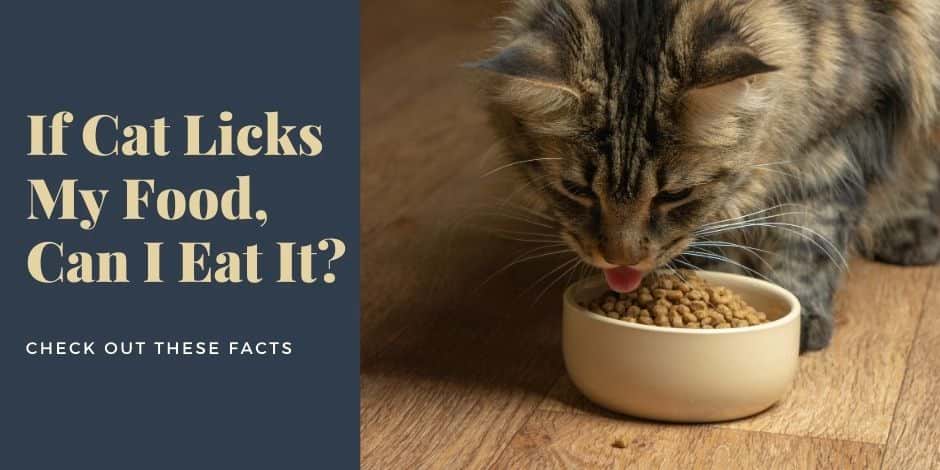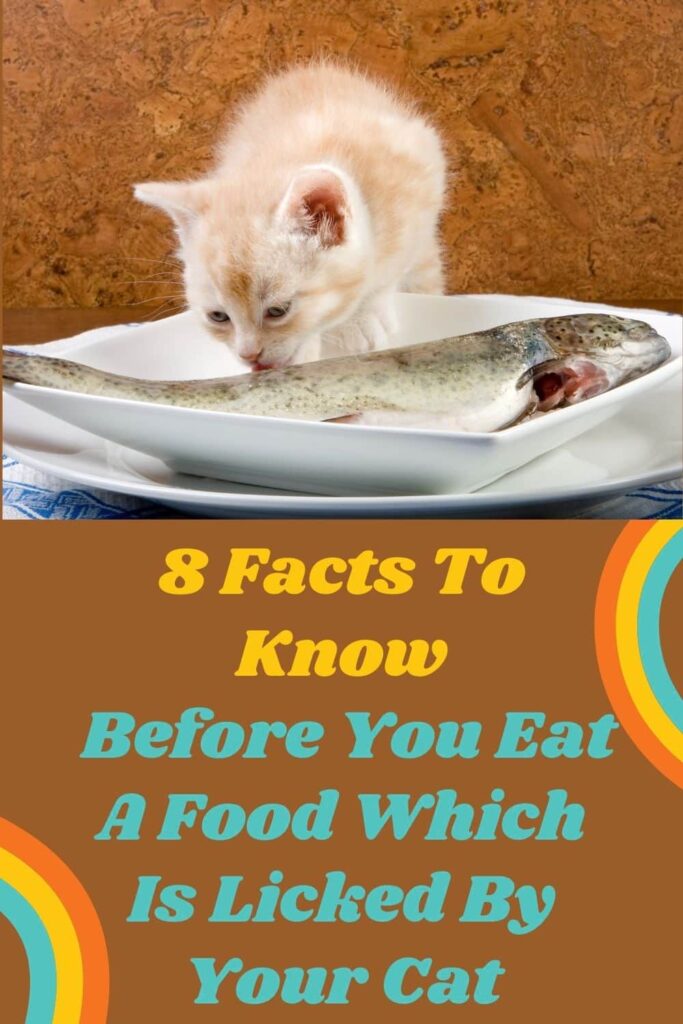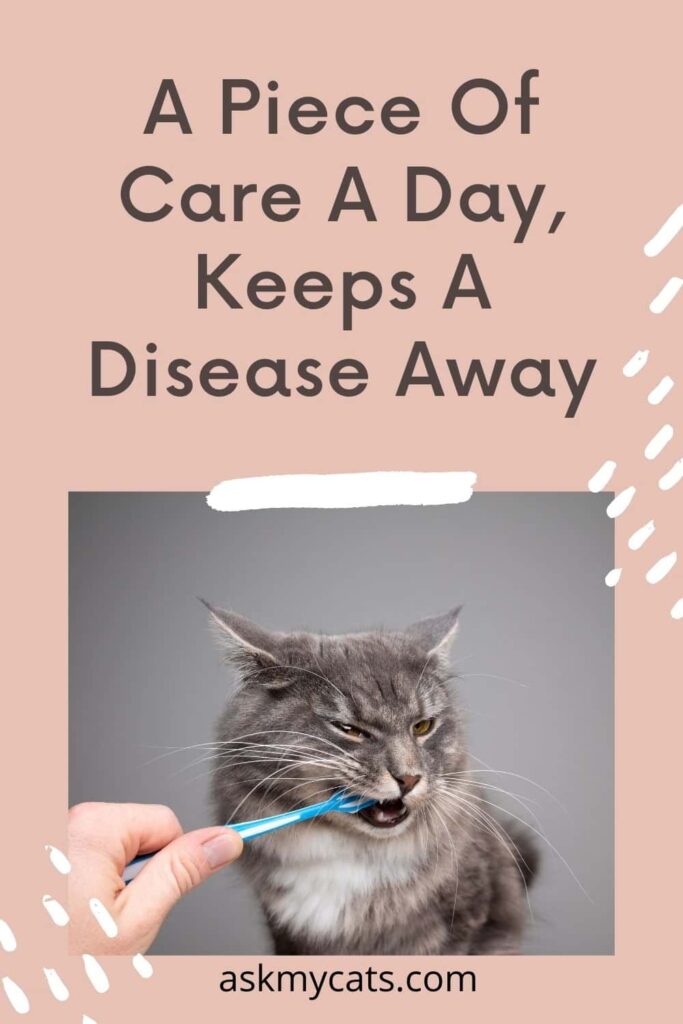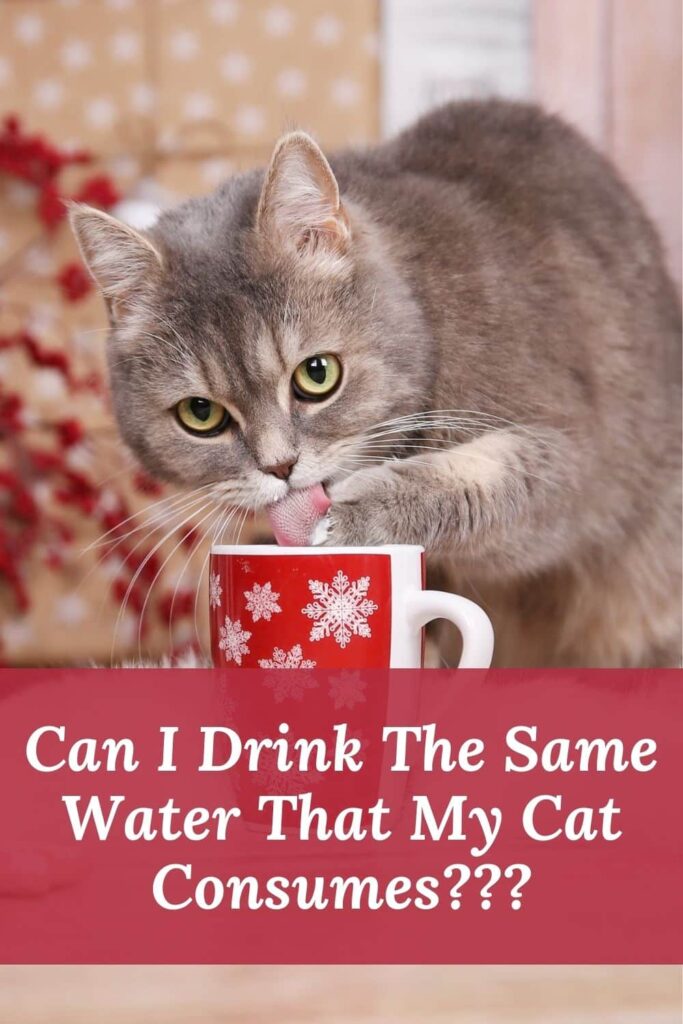So how many of you guys shivered out of disgust after reading the title? I assume a lot of you must have. But the struggles of being a pet lover continue to haunt pet lovers like me enough day and night.
Today, I am going to share my views regarding the most common and asked question over the Internet. What happens when your cat licks the food that was supposed to be consumed by you? Would you just throw it away?
Well, if your cat is in a strict indoor habitat, then no need to worry about the food. You can surely share the food that your cat has licked, but if your cat is a frequent out-goer, then it would be wise enough to avoid sharing food with your kitty.
The main reason behind this is that most outdoor cats have a chance to get infected by some serious microbes and can transfer the germs into your body quite easily.
So, keeping your health at a priority, I would suggest taking precautionary measures regarding this situation and kindly avoid the food item.
Now, let us come to the main point, Audience! What would you do to tackle this situation?
Firstly, you need to know what are the probable outcomes of eating a food slurped by your baby meow. If you are a hygiene maniac, you are good to go with throwing away your loved food. But if not, then give a pause for a while.
I am going to elaborate on all the probable consequences and particular dos-and-don’ts for these specific circumstances.
Here are my top 9 opinions on this contentious question. Keep reading ailurophiles!


Give Your Cat the Perfect Day
Get the Free Ebook!
Can I Eat A Food Which My Cat Licked? 8 Facts

To justify my claim, let me share a piece of my story with all of you. It was my 18th birthday and my parents decided to celebrate it in a noteworthy way.
Birthday Gone Wrong!
My room was surrounded by a lot of guests and to my greatest surprise, I found my cat licking the cream out of the birthday cake I was going to cut.
If you were in my shoes in that situation, how were you supposed to react? That doesn’t count, right? These are all the perks of being an avid pet lover and I assure you must be enjoying all these.
So, my advice would be to restrict your cat’s movement a bit so that no such incidence takes place further. Monitoring your cat’s whereabouts will also be fruitful in taking care of your cat’s health.
By the way thank god it is not a chocolate cake…
1. Origin Matters!
It’s a misconception that a prerequisite for feline happiness is to go outside. It is easy to fulfill their stalking impulse to play regularly with a cat and provide their fun toys, keep them stimulated and provide the exercise they need to remain safe and happy.
Your cat must be strictly an indoor cat wandering around you most of its time. Outdoor cats are more prone to high risks of getting contaminated by deadly viruses and pathogens.
Cats are the most delicate animals which can get ill easily, and soon can transfer the microbes into your body. Imagine a cat sniffing and loitering in dustbins that bites your favorite piece of pizza.
Statutory Warning! Better not think about that, folks! In all, if your cat is outside most of the time, please make sure that it must be disposed or else if your cat is inside most of the time, you can eat the food with precautions.
2. Sickly Kitten
They must have no signs of sickness to show. This entails both present diseases and a history of diseases that can be transmitted between humans and felines.
It’s safe if the disease has been fully eradicated, but as long as a cat is sick, it would be a big no from my side.
3. A Piece Of Care A Day, Keeps A Disease Away?
The owner must take care of the mouth and teeth of the cat regularly. Improper dental hygiene may result in tartar, infections, and other conditions that would not be pleasant to cross paths with.
You have to make sure that your baby has a healthy mouth for the betterment of both of you.
Caring for a kitten is a heavy commitment.

But in addition to nutritious food, a nice place to sleep, and plenty of playtimes, did you know that kittens still need to brush their teeth on a daily basis?
Seventy percent of cats show symptoms of oral and dental disease at the mere age of three. Over 300 species of bacteria naturally live in the mouth of your kitten. And when it feeds, tiny food particles and saliva combine to form plaque with the bacteria.
If the residue is still on the teeth, the calcium in your pet’s saliva hardens it, resulting in a hard yellow-brown deposit on her teeth called tartar.
Regular brushing is the first step in taking care of the oral hygiene of your kitten.
When you clean the teeth of your kitten, extract the plaque and delay the growth of the tartar.
One of the best ways to do this is with a finger brush, which is available in most pet shops.
Your kitten will benefit from yearly or semi-annual dental treatment, very much like you. Cleaning is referred to by vets as dental prophylaxis. It’s the only way to extract tartar, in addition to helping to keep your cat’s teeth and gums safe.
4. Ablutophobia? A Big NO!
Cats usually groom themselves with their tongues to take care of the dirt around their body. But for extra care, consider giving them a full bath.
Try to wipe her down with a damp towel. Kittens usually clean themselves with their tongues, but they have trouble reaching certain spots, like the head, back, and behind.
Usually, mother cats help kittens clean up these spots. With lukewarm water, soak a soft, clean cloth. To irritate your kitten, make sure that the towel is not rough enough.
Consider dabbing the cloth with a vet-recommended pet shampoo if the kitten is pretty filthy.
5. Drinking The Same Water That My Master Consumes? Umm Just A Kitty Way…

The best part is that drinking after your cat is very unlikely to trigger any serious health problems.
Cats can be fancy drinkers, but it can be extremely unpredictable in terms of the amount one cat drinks compared to another.
It can sometimes be an unusual occurrence to see cats drink water, especially if the cat is eating wet food.
Wet food has such a high water content that it can decrease their willingness to drink additional water.
6. It’s Time To Get Alarmed
But if a cat’s saliva reaches the body in the worst case, it can lead to infections, an upset tummy or a patch on the skin.
When they consume each other’s stools or lick each other’s anus, roundworms and hookworm are spread from cat to cat. And all of us have seen this happen.
So, as you may have figured out right now, when they kiss you, cats will spread these parasites. If you are infected with these parasites, it can cause rashes, itching, nausea, stomach pain, diarrhea, fever, and tiredness.
7. The Infamous Cat Scratch Disease
Felinosis or Cat-scratch disease is an infectious disease that most frequently results from a cat’s scratch or bite.
The cat-scratch disease is caused by the Bartonella henselae bacterium, which is thought to be transmitted by the saliva of the cat. In this case, Young cats are at higher risk than older cats.
Make sure you don’t catch ANY of the common symptoms of this disease after sharing your food with your kitten.
8. Cryptosporidiosis
Cryptosporidiosis is caused by a small parasitic worm Cryptosporidium parvum infection. The parasite creates cysts (eggs) that move through infected individuals or animals’ stools.
The cysts can live in moist conditions for 2-6 months and are usually found in lakes and streams. By the fecal-oral route, the parasite is propagated.
By consuming contaminated water or eating contaminated food, or through direct contact with infected cats, people and animals may get infected.
Approximately 50 percent of dairy calves are infected and cysts are shed. Diarrhea and abdominal cramps may be caused by infection.
In healthy people, the disease is self-limiting, but it can be prolonged and more severe in people with compromised immune systems.
You might also like to read about possible reasons behind cat licks food but doesn't eat
Frequently Asked Questions
Can you eat food after a cat has licked it?
There is no specific answer to this question. Generally speaking, if your cat is in good health and an indoor cat, you are relatively on the safe side, although there is no guarantee. If you’re curious, just give them the piece they’ve chosen. They can’t help that they want the same things you do.
Can you get rabies from food that a cat licked?
NO, not at all. Rabies is spread by contact with the saliva of the infected animal. Bites are the most common form of rabies transmission, but when saliva reaches any open wound or mucus membrane, the virus may be transmitted. Licks or bites from rabid animals may also spread the virus as a consequence. The most prevalent source of rabies transmission worldwide is canines, especially dogs since they bite readily and sometimes have contact with humans and other animals.
Can I get sick from drinking the same water as my cat?
It is better not to encourage the matter. Though your cat stays indoors for the maximum time, a probability is that it may catch some rodents or insects inside the house which may also spread diseases.
Is cat saliva harmful to humans?
Clinical illness is uncommon, but people may become infected through bites, scratches, or close contact with cats by Capnocytophaga bacteria. People with compromised immune systems that are still struggling to fend off infections are more at risk of getting sick.
Can you die from a cat licking you?
Cats can carry dangerous bacteria, such as Pasteurella and Bartonella, which can be debilitating for people with compromised immune systems and lead to serious health problems, including blindness and heart attacks.
Which one is more toxic, cat saliva or dog saliva?
Any pet may presumably transmit bacteria and parasites by licking your face and mouth. The bacteria in the mouth of a cat are considered marginally worse than in the mouth of a dog.
Final Words
So, in all, it is up to you if you would share your worthy food with your kitty.
Since cats lick their fur so frequently, following accidental exposure to the fur, traces of household cleaning products often show up in their saliva. This could be the reason if your cat starts drooling excessively or foaming at the mouth.
In this situation, to ascertain the root cause of the problem, take your cat to see the veterinarian, and make sure to use animal-friendly cleaning items in your home. All those deadly hazards might come from mice or soil infected with the different bacteria that they consume.
Food is something that might cause a cat to get infected. This suggests that the cat should be fed with commercially prepared food instead of raw meat. Keeping the cat inside ensures that the cat would be less likely to prey on an infected mouse or bird.
Thus, getting a cat indoors for as long as possible might be worthwhile. It is important to consider litter boxes as possible sources of infection. As a result, litter boxes should be routinely washed and frequently cleaned with detergent and hot water from cat droppings.
The risks of a normal person contracting a cat’s zoonotic disease are low, but more vulnerable to these diseases are people with immature or compromised immune systems.
This involves children, people with acquired immunodeficiency syndrome (AIDS), the elderly, and individuals undergoing chemotherapy for cancer or other medicines that can weaken their immune systems.
In his saliva, your cat will bear roundworm eggs and mono-celled protozoa. If he shares your food or drink, your cat will pass these parasites to you. Roundworms aren’t transmitted by bites, but you can become infected if you accidentally ingest the parasite’s eggs.
There is definitely no danger or significant health threat to the average house cat. Nevertheless, it can bear viruses that will damage its owner. It is important to ensure that every cat has sufficient vaccinations.
Lastly, I would like to know your views regarding this matter. Please express your thoughts and suggestions in the comment section.
Have you ever experienced this type of situation?
Do not forget to mention your experience if you have a pet at your home. Stay safe, healthy, and clean. Till then, keep loving your baby meows!
